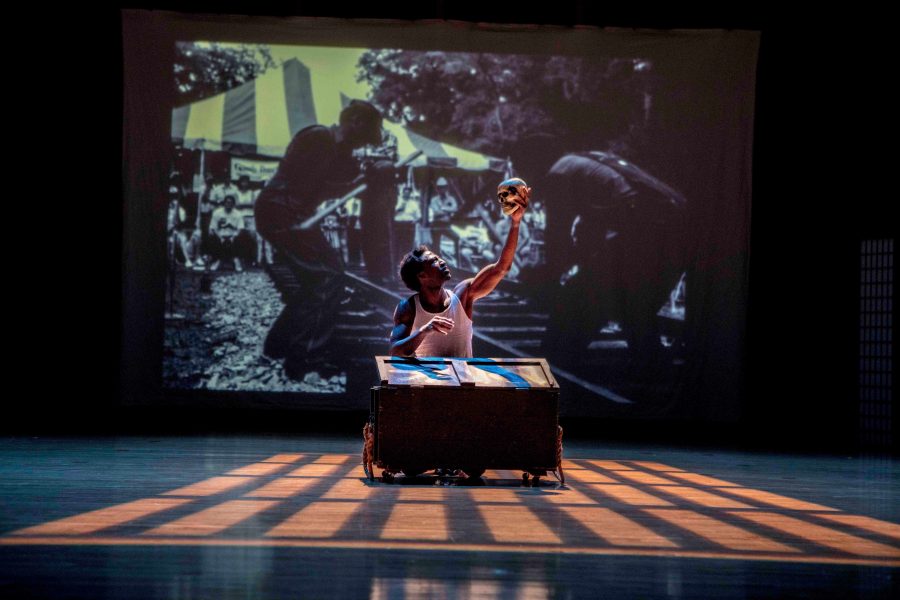Sharpley’s Retirement Leaves Dance Diaspora’s Future Uncertain
Photo by Rick Yu, Photo editor
Semi-professional dance group Dance Diaspora will perform “Black Love: The Incarceration of the Spirit” this weekend, their last show before founder Adenike Sharpley’s retirement.
March 3, 2017
“Black Love: The Incarceration of the Spirit,” Dance Diaspora’s last performance at Oberlin with its original founder, will be held at Warner Main Space today and tomorrow from 8–10 p.m. A semi-professional dance group founded by Africana Studies Artist-in- Residence Adenike Sharpley, Dance Diaspora has performed at elementary schools, high schools, Tufts University, Georgia State University and the Charles H. Wright Museum of African American History in Detroit. The group performs repertoire and choreography drawn from Gambia, Brazil, Cuba and Haiti, as well as African-American Vernacular Dance such as jazz and blues improvisation.
Francisca “Kika” Chaidez-Gutierrez, OC ’05, stage manager and marketing director for Dance Diaspora, has worked with Sharpley for a decade. For her, the group’s mission to celebrate Black dance forms is central to its importance and appeal.
“This group is for everyone, but it especially appeals to people of color because it is empowering Black artists,” Chaidez-Gutierrez said. “We are elevating Black art forms to the same level as Western art forms.”
Chaidez-Gutierrez said she worries about the level of cultural denial concerning Black art history, but believes Sharpley and Dance Diaspora provide motivation and empowerment to students as individuals through dance and community service.
“We are educated … to think that embracing African culture is not important,” she said. “Marginalized communities often inform pop culture and art, but it’s important we recognize our historical roots. There [have] been Black writers, artists, dancers and poets for centuries.”
Participating in Dance Diaspora has been a rewarding experience for many of Sharpley’s students. College senior Khalid Taylor, a musical studies major, decided to join Dance Diaspora because he’s always loved to dance and wanted to find a form that incorporated the whole body, but was also looking for a connection to his identity and roots; for him, Dance Diaspora was a perfect fit.
“This experience has been extremely difficult but rewarding,” Taylor said. “It feels good to perform at a professional level, and nothing is better than when a movement starts to feel natural — although the work is never really done.”
Dance Diaspora has also provided an important space for Taylor as a member of the Black community and he said the performance this weekend is a culmination of that.
“‘Black Love’ is a narrative of Black people’s struggles, triumphs and failures,” he said. “Most importantly, it is a story about love and about how Black love in particular can be sweet and gentle, but also strong, rough, scary and necessary. Lots of forces have tried to prevent it, to stifle it, to oppress it. In that way, Black love is also resistance.”
Sharpley agrees that love is central to the theme of the show, both bodily and spiritually.
“The show deals with issues of family, love, what is beautiful, how we deal with our body, how we move our bodies,” she said. “We don’t see it as nasty or dirty. We use call and response. It’s a very communal show.”
The show also specifically focuses on the love and relationships of people of color. Sharpley stressed that it is “a Black vernacular show with Black dance, Black art forms and Black music [that] focuses on the Black community.”
This show is particularly significant because it is the last show that Sharpley will direct before retiring. It remains unclear what the future of Dance Diaspora holds, but no one has been hired to replace her. Chaidez-Gutierrez fears that if students don’t continue to fight for more art spaces for people of color, those spaces may slowly be lost. Sharpley said she has worked hard to inspire students and foster community, but feels that some of her work has gone underappreciated.
“When we toured other colleges, we were really treated much better than we are at Oberlin,” Sharpley said. “Back at Oberlin, we’re chopped liver.”
Though Sharpley wouldn’t go into specifics about her feelings on Oberlin, Taylor shared the sentiment.
“Miss Ade has done amazing things and she hasn’t received the recognition she should have,” he said, noting that Sharpley has never received the title of professor, despite teaching dance classes at Oberlin for over 20 years.
“Black Love: The Incarceration of the Spirit” will be a culmination of the years of hard work that Sharpley has invested into Dance Diaspora, highlighting the beauty of Black love, the Black community and the relationship between dancers and their bodies, as well as the Black struggle to establish the legitimacy of their relationships and the spaces they occupy.
“Black Love: The Incarceration of the Spirit” runs tonight and tomorrow night from 8–10 p.m. Tickets are available for $5 via CTS in advance of the show and $10 at the door.





















